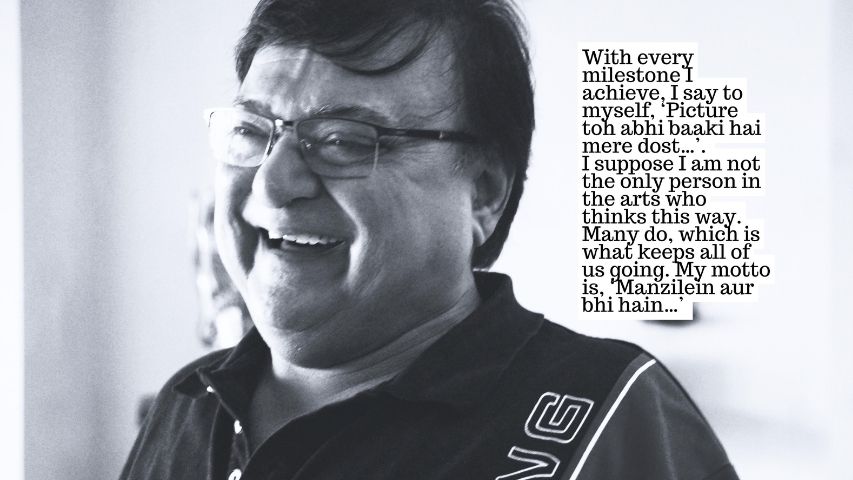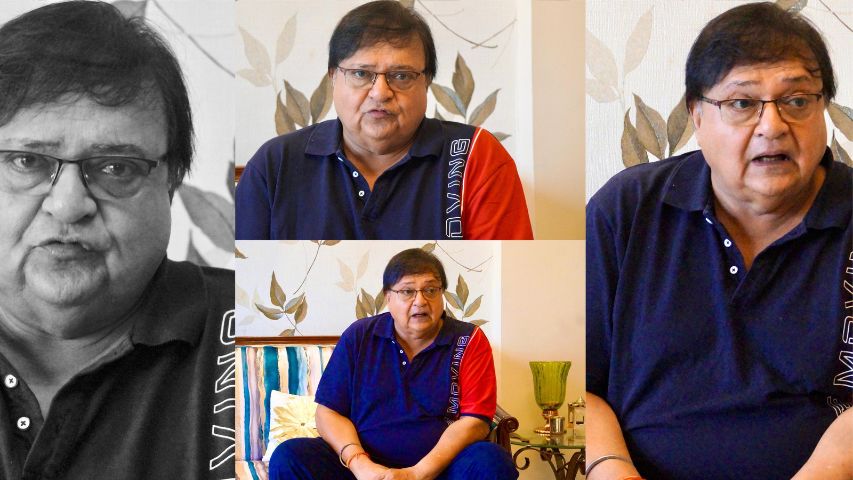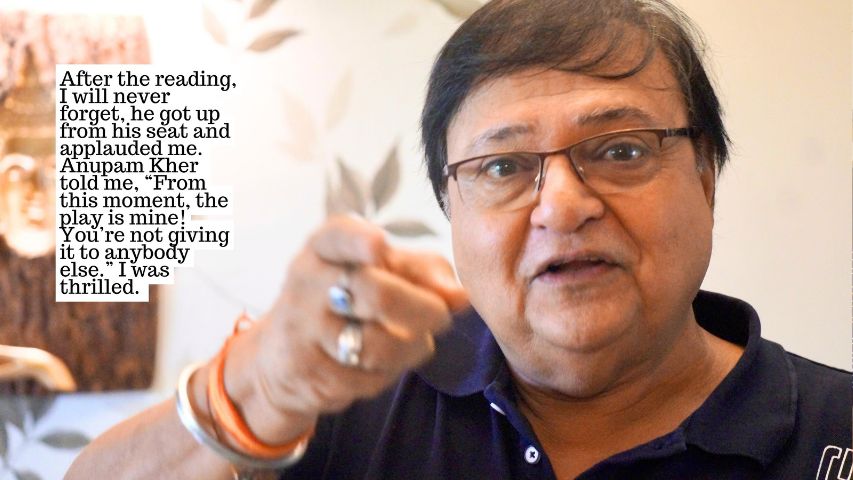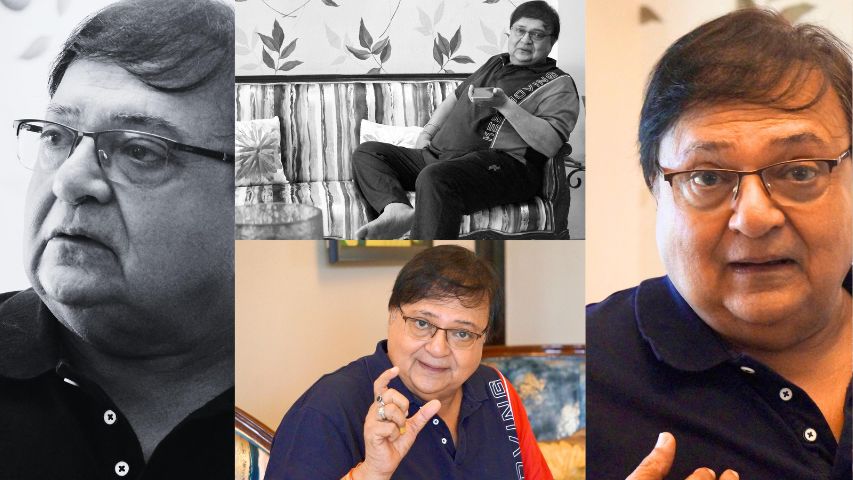-853X543.jpg)
FROM RAKESH BEDI, WITH LOVE!
by Vinta Nanda September 27 2023, 12:00 am Estimated Reading Time: 12 mins, 58 secsVinta Nanda takes a tour around the life of writer, playwright, dramatist and actor Rakesh Bedi along with him in this interview that covers it all!
He’s one actor who has worked consistently on all mediums, be it film, television and, now, streaming platforms, for about forty years, and with each of his performances, he strikes a chord with the audience.
His name figures among the credits in important works (films and television) of the times, which have gained cult status over the years.
Some of his performances remain unforgettable. He essayed the role of Omi in Chashme Baddoor (director: Sai Paranjpye), Raja in the television comedy Yeh Jo Hai Zindagi (writer: Sharad Joshi and directors: Kundan Shah, Manjul Sinha and Raman Kumar), Danny in the first feminist series on Indian Television Tara (writer: myself and director: Raman Kumar), and Dilruba in Shrimaan Shrimati in more recent times.
Before starting out for this interview with him, I was trying to figure out the secret behind his long innings as a successful actor, a man on top of his game. I chanced upon his spoken words in an interview with Shweta Sharma of the Indian Express, where he said, “I have always been a theatre artist. In fact, even before I went to FTII, I was a part of a theatre group in Delhi and did a lot of plays. Then, the day I graduated I joined Indian People’s Theatre Association (IPTA), the oldest theatre group in India, and ever since, there has not been a single month in my life where I have not stepped on to the stage – except for the two years of COVID. And I must say that it is easily manageable and is a wonderful learning ground as it is the only place where you get bouquets and brickbats instantly”.
I suppose, his relentless pursuit of the art and craft of acting is what keeps him ahead of the times as a performer, and his work in theatre is the force that drives his very successful journey. He is also seen in Taarak Mehta Ka Ooltah Chashmah, the most popular and, perhaps, one of the longest television series of our times. When asked, he says, “I can go on and on about the idea of ‘humour’. It comes naturally to me”.
When I started out in my career, he was one of the lead actors in many of the television serials (Yeh Jo Hai Zindagi, Guni Ram among others), which I happened to be an assistant director in, also the film Parbat Ke Uss Paar. I will never forget him sitting me down on the sets, when I was the junior assistant, and teaching me how I must give cues to actors during the filming of their close ups. At many other times, especially when I was producing and writing the serial Tara, he would discuss his character (Danny) with me and pore over every scene I wrote. His contribution to his own role was immense.
Other than that we have, of course, been next door neighbours now for over 30 years. We reside on the same floor and deal with the same society issues (ha-ha!). I can call him a good friend of mine. Here I go into Rakesh Bedi’s journey as an actor as I converse with him about his life and other things. So, over to him…

What does it feel like from where you are today, when you look back?
It’s almost 47 years now since I’ve been in Mumbai, the Bombay of yore. I’ve been constantly working at being a fine actor. Across all the years that I have been working, I’ve carried with me a feeling that ‘nothing has happened as yet’, and also that ‘I have a long way to go’.
I do wonder what I am waiting for, because when I ask myself where I am in life, the answer I get is that ‘the best is yet to come’. I suppose that’s what drives me and keeps me going, whether it’s theatre, films, television and now that I am also working in several web-series.
I guess I’m waiting for a moment I haven’t experienced until this time, a high in my work, which I’m yet to achieve, a role that promises me far more than the best work I have done so far.
I’m writing plays, I’ve done more shows in theatre that I can count, I travel all over the country with my plays…with every step I take, every milestone I achieve, I say to myself, ‘Picture toh abhi baaki hai mere dost…’.
I suppose I am not the only person in the arts who thinks this way. Many do, which is what keeps all of us going. My motto is, ‘Manzilein aur bhi hain…’
What is it that took you to FTII for the actor's course?
I was doing theatre while I was a student at Delhi University. I was sure I wanted to be an actor. The National School of Drama was a stone’s throw away from where I was, but at the time there were very few students from the NSD who would make it to films.
I wanted to know cinema, I wanted to be a film actor, so I chose to go to FTII. It was another experience for me when I entered the institute in Pune. I got to see the best of world cinema, often five films a week were screened for us by the greatest filmmakers in the world. It was a cinema I would not have had access to otherwise.
As an acting student, it was so important for me to experience all aspects of filmmaking, not that I wanted to be a director, sound designer/engineer, cinematographer or any such thing. But the immersion I got at the FTII was not just heady but also absolutely consuming. To sit in groups and discuss every bit of the process was a learning I have received that remains unsurpassed till today.

When you stepped into the Bollywood industry, as a newcomer, what was it like? How did you cope and what were the milestones that you count, which brought you to become famous, and a star?
When I entered the industry (chuckles), the only hope, the only aspiration was to be an actor in films, because cinema was the one and only avenue for us in those days. There was no television, and the OTT platforms were not imaginable, then, in the furthest horizons.
For any actor, in those days, it was a dream-come-true to be in a mainstream film and find yourself on its poster. So was it for me as well.
My first film was Hamare Tumhare and before its release the posters were all over in the city of Mumbai and the country. I was one of the faces on them. I remember I went all the way from the suburbs to Bombay Central Station, to see myself on a poster I was told was put up there. In those days posters were painted by hand. It was a huge deal for an actor to find himself on them, to know that it was a real artist who had painted him.
I can now recall how important a moment that was for me when I saw myself on the poster of Hamare Tumhare for the first time. It was difficult for actors to get significant parts to play, because the films were so few and the aspirants so many. I chose comedy as my medium because I felt it would be easier for me to find a foothold in the industry, and it worked. Taking the route, I know, gave me an entry through the door.
Looking back at the high points of my career, well, there have been many. There’s a film called Chashme Badoor (cult), Ek Duje Ke Liye was a big hit, and then came television and Yeh Jo Hai Zindagi (cult) became a rage. It was followed by Tara (cult), I did with you, which was a trailblazer. Particularly my role as Danny became a big thing. Shreeman Shrimati and Yes Boss were also milestones and they are counted among the best works of Indian Television today. I was fortunate to have done roles in all the big hits.
I did a lot of cinema all along, also some of the most unforgettable films of the filmmaker David Dhawan. I must have done, by now, anything between 250 to 300 films, which is a lot. There are probably a similar number of films that I’ve acted in, which never got released.
I think I’ve done a lot of work, and am continuing to do so as we speak. But yet I always have this feeling, like I’ve told you earlier, that ‘the best is yet to come’, that ‘manzilein aur bhi hain.’ I keep hearing my inner voice say to me that ‘picture toh abhi baaki hai mere dost’…I suppose the feeling must remain.

After the many TV Shows that you did, and were top rated, you became a household name, what drove you to the next leg of your life - in theatre, films and now web-series?
There was always a writer lurking inside of me. It was in 2004 when I wrote the play, Mera Woh Matlab Nahi Tha. It was just for a lark. I kept revisiting the script and making changes as I rewrote it several times. The confidence that it was written well came to me after I narrated it to some of my co-actors on the set of Yes Boss, during some free time we had at hand. I was surprised when they unanimously told me that they were compelled by the script and it overwhelmed them.
Then, a while later, I was in Manali shooting for a film. Anupam Kher was there, too, and both of us got a day off during the schedule. Anupam suggested we go for a drive and check the place out. Enroute, amid the Manali hills, Anupam expressed to me that he was hunting for a play to produce and act in so I told him about this one I had written. When he heard I was carrying the script on me, he insisted on a narration. So, we headed back to the hotel.
After the reading, I will never forget, he got up from his seat and applauded me. He told me, “From this moment, the play is mine! You’re not giving it to anybody else.” I was thrilled. I knew that I had written a good play, but the validation from Anupam confirmed it. The rest is history. I’ve written seven plays thereafter. I’m writing three plays presently. I’ve developed ideas for web-series as well. Let’s see where my work goes.
What compelled you to become a playwright, screenplay writer?
(He gives it a deep thought before answering this one) Uhm…these days things are different to what they were before. Earlier I would shoot for six to seven films concurrently, and be hopping studios, going from one location to another, from one city to another, through the month. Nowadays things don’t work like that. You work on one project at a time and it leaves you with a lot of time at hand. There are many gaps between shooting dates. I use that time to write. I write poetry, ghazals, and do shayari also. I recite my work in mushairas, both online and offline. It’s important for me to remain busy, mentally and physically.
Theatre occupies a large part of my time. I do shows continuously and travel a lot with my plays. I wrote a play for IPTA called Biwi O Biwi, another play called Shimla Coffee House. I also produced and directed the plays Jab We Separated and Patte Khul Gaye. At present I’m writing another play for IPTA by the title of Jhilmikhil. It is a beautiful story set in a prison. I have set the play between 9am to 6pm and wound my story around the 10 hour timeline.
So, theatre, now, keeps on the treadmill. Cinema and web-series fill up the empty spaces. And, the time I have in between, I write, write and write more.

What are you doing these days and where are you headed from here as an artist, performer?
I’m a part of two long running television shows – Bhabhiji Ghar Pe Hain and Taarak Mehta Ka Ooltah Chashmah. Because of both, which are popular across the country, I am in the hearts and minds of Indian audiences across the country, and that gives me a lot of happiness.
I do get offers for the daily soap operas but I don’t take them because they demand twenty to twenty five days a month of time from me. That leaves me with no time to do all the many things I love to do and am committed to, like theatre, writing, poetry and of course the films and web-series that I do. As an actor I am fully satisfied and prefer not to find myself cornered into doing only one thing. Everything I do makes me the person that I am, so letting go one or the other is not an option.
As an actor, what would you say to the young generations aspiring to be noticed and celebrated?
To young actors and new aspirants I say ‘please learn your art’. It’s very important to know the craft well because it takes precedence over the art after a point in time, and every actor needs to be on top of the game in a fast changing world. I tell youngsters in theatre as well as cinema, when I meet them, that ‘you will be left behind if you’re not on your toes all the time’.
I see that television has made many actors believe that by giving their bare minimum, they have arrived. The bare minimum may get actors jobs because a guaranteed result is all that television producers and channels are looking for. However, they must know that there are thousands of artists like them in the industry. It’s that little extra, which an actor delivers, beyond what is expected from him as the bare minimum, which makes him stand out from the crowd.
That little more comes only if an actor knows his craft well. For that, actors need training, a thought process. I feel every actor needs grooming. There’s a lot of talent around and there are too many good actors in the space today. The thing most youngsters who are entering the industry must know is that when they come from a pond and dive into a vast ocean (entertainment universe), it is only their art and their knowledge of craft that will keep them afloat and swimming. The craft of acting is even more important than the art according to me.




-173X130.jpg)
-173X130.jpg)
-173X130.jpg)


-173X130.jpg)
-173X130.jpg)
-173X130.jpg)